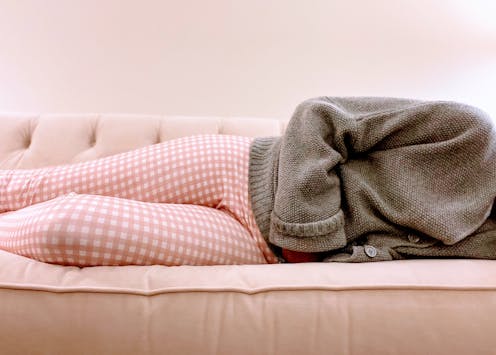Short-sleepers are more likely to suffer from irregular and heavy periods
- Written by Kat Kennedy, PhD Student, Physiology, University of Arizona

The Research Brief[1] is a short take about interesting academic work.
The big idea
Menstruating women who sleep less than six hours a night tend to suffer heavier and irregular periods. That is the conclusion from our new study, which was recently published in the Journal of Sleep Research[2].
We found that those who got less than six hours of sleep on average nightly were 44% more likely to have an irregular period and 70% more likely to have heavy bleeding during a period than healthy sleepers who got seven to nine hours.
Many people understand the importance of a good night’s rest, but even myriad new therapeutics, treatments and tracking apps are leaving women behind. We analyzed survey data from 574 menstruating females from age 24 to 40. They were asked about menstrual bleeding and regularity, sleep and how well they functioned during the day. We found that those who experienced heavy or irregular periods were more likely to suffer from short and poor-quality sleep, fatigue, stress and depression.
One might ask: Which comes first, the chicken or the egg? When females experience mood swings, cramps, irritability and fatigue before or during periods, they can suffer from disturbed sleep[3]. These symptoms are all characteristic of premenstrual syndrome – widely known as PMS – or premenstrual dysphoric disorder, which can cause severe depression or anxiety in the lead-up to a period.
On the other hand, sleep loss itself can lead to worse pain[4], which can intensify PMS and premenstrual dysphoric disorder symptoms. Females are also more likely to suffer from anxiety[5] when they lose sleep, making it even more difficult to fall asleep.
Why it matters
Females are 40% more likely[6] than males to suffer from insomnia. The leading treatments, however, rarely consider menstrual health. Cognitive behavioral therapy for insomnia is recognized by the American College of Physicians as the first-line treatment for insomnia. While this behavioral therapy is effective for those living with chronic pain[7] and depression[8], it hasn’t yet been tested for menstrual symptoms that ebb and flow each month.
Doctors sometimes prescribe drugs such as Valium and Ambien to help with sleep disorders, but these can lead to dependency[9], withdrawal syndrome[10] and other cognitive dysfunctions[11].
Oral contraceptive pills are frequently given for problematic periods, but these come with some risks and tradeoffs: They have been linked to depression[12], suicide[13], blood clots[14] and breast cancer[15].
What’s still not known
Researchers like us who study women’s health don’t yet fully understand the intricacies of the relationship between menstruation and sleep. Menstrual complaints are often not taken seriously; for instance, it can sometimes take years to receive a diagnosis of endometriosis – a condition in which uterine tissue grows outside of the uterus in places such as the fallopian tubes, characterized by heavy periods and pain. For about 25% of women[16], this condition appears asymptomatically at first, making it harder to identify.
However, we believe menstrual complaints could be improved with better education about how to effectively diagnose these conditions. There must also be better awareness about implicit bias among medical providers against those with menstrual health complaints.
What’s next
Medical providers and patients could also communicate better. For example, doctors might take a broader look at menstrual symptoms and consider how important life transitions – puberty and stressors like the elusive work-life balance or starting a family – can worsen mental health, pain and sleep problems. This holistic approach could better serve patients and lead to more sustainable long-term solutions.
Women can also take an active role in their menstrual health by practicing mindfulness techniques such as meditation and relaxation. Every woman is different. The root causes of pain vary from person to person, and so do strategies to improve sleep.
A Band-Aid approach to solving menstrual and sleep problems is unsustainable and can cause more serious problems. By adopting a more holistic mind-body model to treating these complaints, doctors could improve what is otherwise a monthly struggle for many women, thereby boosting quality of life and overall health.
[Get our best science, health and technology stories. Sign up for The Conversation’s science newsletter[17].]
References
- ^ Research Brief (theconversation.com)
- ^ Journal of Sleep Research (doi.org)
- ^ disturbed sleep (doi.org)
- ^ lead to worse pain (doi.org)
- ^ more likely to suffer from anxiety (doi.org)
- ^ 40% more likely (doi.org)
- ^ chronic pain (doi.org)
- ^ depression (doi.org)
- ^ dependency (doi.org)
- ^ withdrawal syndrome (doi.org)
- ^ cognitive dysfunctions (doi.org)
- ^ depression (doi.org)
- ^ suicide (doi.org)
- ^ blood clots (doi.org)
- ^ breast cancer (www.nejm.org)
- ^ For about 25% of women (dx.doi.org)
- ^ Sign up for The Conversation’s science newsletter (theconversation.com)
Authors: Kat Kennedy, PhD Student, Physiology, University of Arizona

